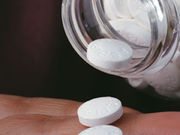Less stroke severity for aspirin users versus nonusers with large artery atherosclerosis
MONDAY, Jan. 18, 2016 (HealthDay News) — For patients with atherothrombotic stroke, pre-stroke aspirin use may reduce initial stroke severity, according to a study published online Jan. 11 in the Annals of Neurology.
Jong-Moo Park, M.D., Ph.D., from Eulji University in Seoul, South Korea, and colleagues examined the effect of pre-stroke aspirin use on initial severity, hemorrhagic transformation, and functional outcome of ischemic stroke. They identified 10,433 patients with acute ischemic stroke (large artery atherosclerosis [LAA], small vessel occlusion [SVO], or cardioembolism [CE]) from a multicenter stroke registry database. They compared pre-stroke aspirin users and nonusers in terms of National Institutes of Health stroke scale (NIHSS), hemorrhagic transformation at presentation, and discharge modified Rankin scale (mRS).
The researchers found that 18.3 percent of patients reported pre-stroke aspirin use. Initial NIHSS scores of aspirin users were higher than nonusers on crude analysis (mean difference, 0.35). In multivariable analysis there was an interaction effect of pre-stroke aspirin use and stroke subtype, with aspirin users having less stroke severity than nonusers in LAA, but not SVO and CE (mean difference in NIHSS scores in LAA, −0.97). There were no significant interaction effects with respect to hemorrhagic transformation and mRS. Pre-stroke aspirin use correlated with increased risk of hemorrhagic transformation (adjusted odds ratio, 1.34) and with decreased risk of higher discharge mRS (adjusted odds ratio, 0.86).
“Pre-stroke aspirin use may reduce initial stroke severity in atherothrombotic stroke and can improve functional outcome at discharge,” the authors write.
Copyright © 2016 HealthDay. All rights reserved.








